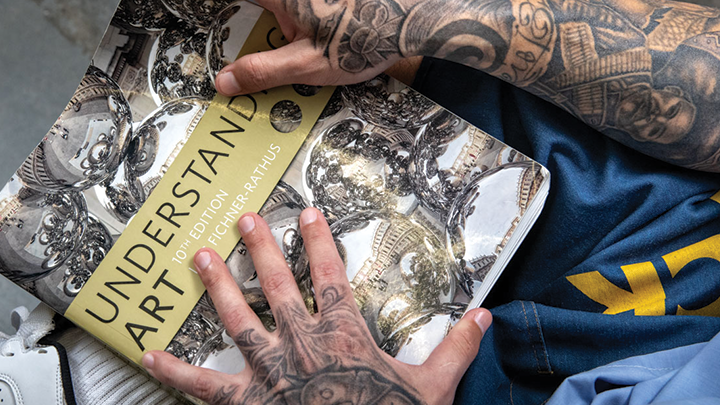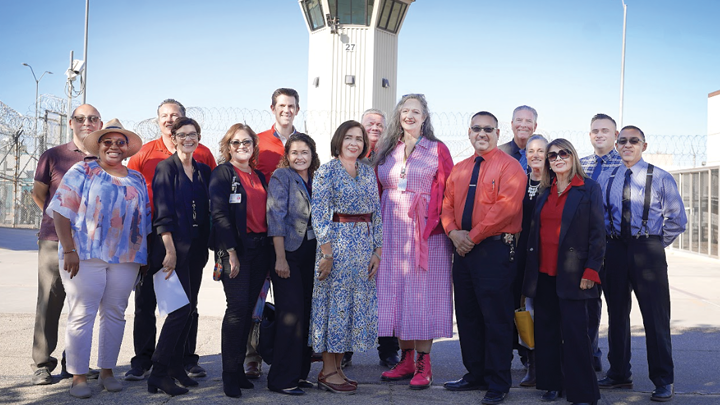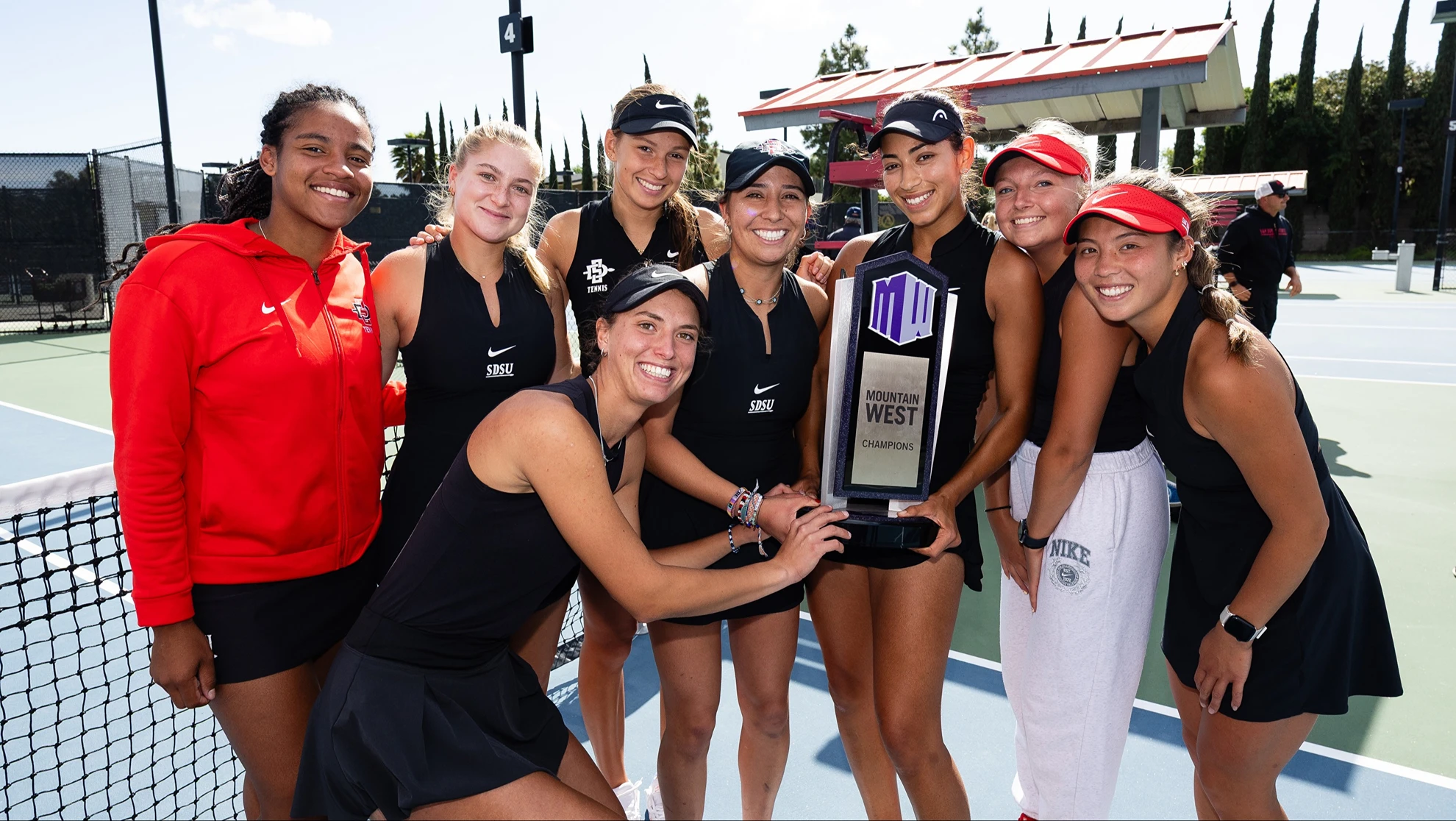Centinela prison B.A. program to expand under $1 million Mellon Foundation grant
SDSU’s VISTA will add a humanities degree and develop a toolkit to help spread education to other locations.

San Diego State University will use its experience bringing higher education to prisons to help train other educators to do the same, drawing from a newly announced $1 million grant from the Mellon Foundation that will also introduce degree offerings in the humanities at Centinela State Prison.
The grant supports SDSU’s VISTA (Valuing Incarcerated Scholars through Academia) program, which currently awards B.A. degrees in interdisciplinary studies at Centinela State Prison in Imperial County, near the City of Imperial. It will be led by Annie Buckley, a professor in the School of Art and Design, who initiated VISTA in 2019 and has 10 years of experience facilitating programs in prisons across California through her work with Prison Arts Collective.
Buckley said an interdisciplinary team will look at the specific learning needs, interests and goals of the prison population, gaining knowledge to develop tools they will pilot at Centinela, in the hope they will spread elsewhere as part of a growing, national movement.
“Our team includes scholars from diverse disciplines and with lived experience of incarceration. We are excited to apply both creativity and evidence-based practices to support students and share what we learn by creating a toolkit to share with colleagues in the field,” Buckley said.
“We’re dealing with a population of people who are oftentimes living within a cycle of trauma and they are trying so deeply to break that cycle with education.” Educators in prisons, for example, need to be sensitive to the needs of people who have experienced poverty or racial discrimination, Buckley said.
 Team members from SDSU and Centinela State Prison with one of the two first cohorts of students in the SDSU-VISTA program. (SDSU)Path toward a degree
Team members from SDSU and Centinela State Prison with one of the two first cohorts of students in the SDSU-VISTA program. (SDSU)Path toward a degree
Using an identity-first approach to language that seeks to avoid stigmatizing or dehumanizing individuals — a prevailing trend in criminal justice reform — Buckley carefully refers to those enrolled in the program as students incarcerated at Centinela and not the more familiar terms for those in prison.
Indeed, many are first-generation students who want to set an example for their families, Buckley noted. Or as one student told her: “I want to get a degree because education changed my thinking.”
SDSU’s B.A. program at the all-male prison in Centinela currently offers two-year continuation degrees in interdisciplinary studies to those who have completed a two-year associate degree for transfer programs while incarcerated. It will expand to journalism in August, and Buckley said the Mellon grant will include expanding to an additional degree in the humanities.
Current course offerings in the interdisciplinary studies program entail art and design, journalism and media studies, and communication. Those subjects were selected to both appeal to prisoners’ interests and potentially prepare them for jobs in related fields when they are released, Buckley said.
“We wanted to give our students the opportunity and the skills to learn to tell their own stories as well as to tell stories around the world,” Buckley said in explaining the choice of journalism as an additional field. “We want to empower them to tell stories of mass incarceration through their own lived experience.”
The new humanities degree program will be developed with input from students and colleagues across disciplines, including some who were formerly incarcerated, in the hope of making it “responsive to the needs and interests of the (prison) population.”
“I’m very honored and excited to have this opportunity from the Mellon Foundation to expand the program in meaningful ways to support students,” said Buckley.
 SDSU President Adela de la Torre and Superintendent of the CDCR Office of Correctional Education Shannon Swain (center) visit the VISTA program alongside leadership from SDSU, CDCR and Centinela State Prison. (SDSU)
SDSU President Adela de la Torre and Superintendent of the CDCR Office of Correctional Education Shannon Swain (center) visit the VISTA program alongside leadership from SDSU, CDCR and Centinela State Prison. (SDSU)
Expanding an existing partnership
The California Department of Correction and Rehabilitation has been a strong and essential partner in the program, Buckley noted. Unlike many similar programs, VISTA is specifically designed to serve students who are incarcerated from both the general population and those who have been separated into a more restricted population, a category that may include those convicted of specific offenses, ex-gang members or who identify as LGBTQ.
The humanities are an area of particular interest to the New York City-based Mellon Foundation, which supports the arts and humanities and identifies “Imagining Freedom” as one of its initiatives. The Mellon Foundation previously awarded SDSU grants in 1991 ($124,000) for research on immigrant school children and in 1997 ($100,000) in support of a program in Middle Eastern population studies.
“We are delighted to support SDSU’s VISTA in bringing high quality liberal arts education to the drastically underserved incarcerated population at Centinela in the Imperial Valley, a population that has so much potential,” said Mellon Senior Program Officer Carolyn Dinshaw.
Buckley said SDSU President Adela de la Torre’s support for the prison education program also was instrumental in securing the grant.
“Data clearly shows that those with college degrees not only lead happier, healthier and more stable lives, but are stronger contributors to their communities and to society,” de la Torre said. “Providing that transformative path to California’s incarcerated population aligns perfectly with SDSU’s commitment to providing students of all backgrounds and identities with access and opportunity for brighter futures.”



